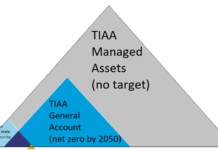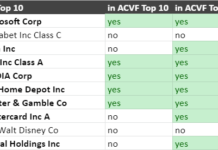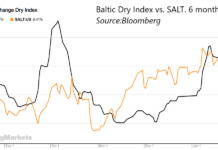Tom Konrad CFA

Jesus Saves, but where does he invest?
Photo via Bigstock. |
This article is not about the Church, or abortion. As far as I know, the former does not invest in the latter.
This article is about investing, and morality.
Since 350.org began its campaign to get endowments and pensions to divest from fossil fuels, I’ve heard two basic criticisms of the movement from my colleagues in the investment management profession.
- Endowments selling their fossil fuel investments won’t stop us from using fossil fuels.
- Morality has no place in investment decision making.
Both these arguments fail to pass the sniff test, and the point of my title and subtitle were show their failings in a stark light to those who don’t necessarily agree with the need to transition away from fossil fuels.
The Effectiveness of Divestment
Starting with the first argument, that divestment will not be effective at combating climate change. While there may be some question about the effectiveness of divestment, its effectiveness or ineffectiveness is beside the point. If you doubt me, try to imagine trying to persuade His Holiness the Pope that the Church investing in abortion clinics would be all right, since abortions would continue to be performed with our without the Church’s money. You may not agree with the Pope’s stance on abortion, but I’m sure you’ll agree that you’d be unlikely to get out of that conversation without having to say more than a few Hail Marys.
Since the Church’s stance on abortion is a moral one, the effectiveness of abortion divestment is irrelevant compared to the hypocrisy of any such investments. As is the hypocrisy of institutions whose mission is to ensure our future well-being when they invest in companies which undermine that well being.
Morality and Investing
The second argument, that morality has no place in investment decisions, is equally specious. Just ask His Holiness (assuming you still have a voice left, after all the Hail Marys.) If you think this only applies to religious institutions, consider the following investment:
You are traveling in a country where murder is perfectly legal on Fridays. A trustworthy man of your acquaintance has been hired to feed a dozen children to starving lions for the amusement of his wealthy patron, for which he will be paid $100,000. Unfortunately (for him, if not for the children), your acquaintance lacks the funds to acquire the necessary starving lions, and he turns to you. If you invest the $10,000 he needs to purchase the lions today, and he will repay you with half of his fee ($50,000) after he is paid next week. In order to emphasize the moral aspects of the investment, we are assuming that all this is perfectly legal, and, because of both your acquaintance’s reputation and the legal documents which have been drawn up, you have no doubt you will be paid. As an investment, feeding children to hungry lions would be rock solid, and would result in a five-fold return on your investment in less than a week.
Low risk, high reward: Sounds like a great investment. Except for the feeding children to lions part. You wouldn’t have to be religious to want to avoid this lion-feeding investment.
Conclusion
There are still valid arguments that Endowments and other such institutional investors should continue to invest in fossil fuels. If it it is their considered belief that the profits from such investments can be used to more than offset the harm done by those investments, then they might consider it moral to invest anyway. Yet even this decision would be morally questionable. Is it right to feed a dozen children to starving lions, even if the funds will be used to save two dozen children from similar fates?
In any case, this is not an argument that morality has no place in investing. Rather, it is about what is the best way to serve the institution’s mission. In short, it is about taking a moral stance with investments, both the institutions’ and our own.
Is there a cost to investing with out morals? Perhaps. There is also the possibility of financial gain. If governments ever decide to get serious about climate change, they will take actions which make it less profitable to extract and burn fossil fuels. Less profitable operations would hurt the stock prices of such companies. That’s why oil and coal companies are so adamant about opposing any sort of climate legislation. Companies which provide alternatives to fossil fuels, or enable us to use less of it will benefit from the same legislation.
When regulators enforce regulations which reflect a moral principal, moral investors will benefit, and amoral investors will be hurt. This brings us to another reason to apply our morality to our investment decisions: it aligns our financial interests with what we know to be right. In a democratic society, this frees us to push our lawmakers to act in a moral fashion, without having to worry that the reforms we are pushing for will harm our financial interests.
There may or may not be a cost to investing in fossil fuels, and divesting from fossil fuels will not stop the economy running on them. But if you believe that burning fossil fuels is harming our current and unborn children, why are you investing in them? And why is your college or pension fund?
Update: Although this article was published at shortly after Pope Benedict XVI announced his resignation, it was written before the news came out, and has nothing to do with the resignation, which was apparently due to poor health.
This article was first published on the author’s Forbes.com blog, Green Stocks on February 11th. Forbes’ editors felt the headline would be offensive to some, and a reworked version is now posted here.
DISCLAIMER: Past performance is not a guarantee or a reliable indicator of future results. This article contains the current opinions of the author and such opinions are subject to change without notice. This article has been distributed for informational purposes only. Forecasts, estimates, and certain information contained herein should not be considered as investment advice or a recommendation of any particular security, strategy or investment product. Information contained herein has been obtained from sources believed to be reliable, b
ut not guaranteed.








